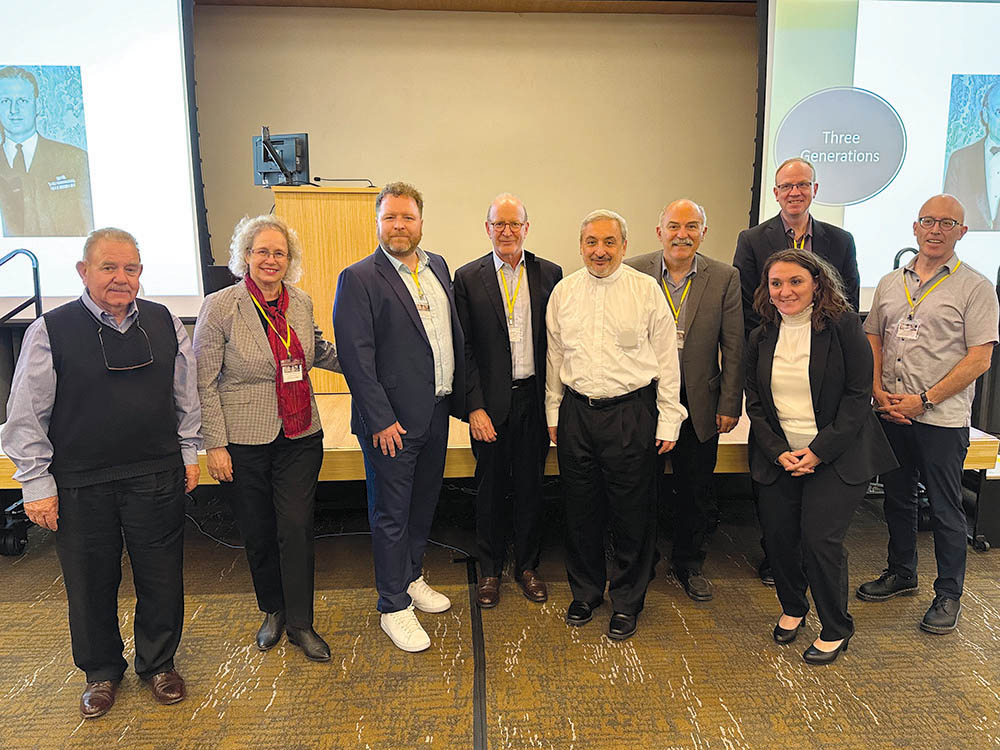
Staff Report
The 11th Annual “Genocide Awareness Week,” sponsored by the Rosenbluth Family Charitable Foundation, was held April 17-21, 2023, at Arizona State University in Tempe, Arizona.
“Genocide Awareness Week” is a series of lectures, exhibits, and storytelling by distinguished survivors, scholars, politicians, activists, artists, humanitarians, and members of law enforcement. This week-long event seeks to address how we, as a global society, confront violent actions and current and ongoing threats of genocide throughout the world, while also looking to the past for guidance and to honor those affected by genocide.
This year’s “Genocide Awareness Week” featured a variety of presentations and movies focusing on the Armenian Genocide. Prof. Barlow Der Mugrdechian of Armenian Studies Program at Fresno State and Fr. Zacharia Saribekyan, Pastor of St. Apkar Armenian Apostolic Church in Scottsdale, are on the “Genocide Awareness Week” board and organized the Armenian related events. The Armenian Studies Program and St. Apkar Armenian Church were also financial sponsors of the week.
On Monday, April 17, two special sessions were held. Dr. Taner Akçam, director of the Armenian Genocide Research Program of the Promise Armenian Institute at UCLA, gave a presentation on “What’s Next?: Armenian Genocide Restitution in the Post-Recognition Era.” The talk was based on a recent conference that Dr. Akçam had organized at UCLA, and explored questions such as: what are the possibilities of creating an Armenian Genocide reparation movement post-recognition by President Biden and Congress in 2021? What opportunities does the American legal system offer for reparation? Can the Holocaust restitution movement serve as a model for the Armenian Genocide?” A video interview with Ambassador Stuart Eizenstat framed comparative restitution efforts in achieving some measure of justice for the post-Holocaust restitution movement.
An Armenian musical interlude followed featuring performers Narine Babayan on kanun, Gevork Gevorkyan on kemancha, and Daniel Decker performing vocal numbers.
Robert Morgenthau, great-grandson of U.S. Ambassador to Turkey Henry Morgenthau (1913-196), gave the keynote address for the week-long conference speaking on “Spreading the Word: From the American Committee for Syrian and Armenian Relief to the Museum of Jewish Heritage – A Memorial to the Holocaust.” Morgenthau’s presentation focused on how four generations of Morgenthau family members have been involved in humanitarian efforts in various areas of the world.
On Tuesday, April 18, Berberian Coordinator of Armenian Studies at Fresno State, Prof. Barlow Der Mugrdechian, participated in a discussion on “Denial of the Holocaust and the Armenian Genocide,” with Dr. Sarah Cushman of the Holocaust Educational Foundation of Northwestern University. Prof. Der Mugrdechian gave an overview of the various stages of denial by the Ottoman Empire and the Republic of Turkey, from 1918 to the present, and then participated in a discussion with Dr. Cushman on comparative aspects of Genocide and Holocaust. Audience members participated in the discussion with their questions.
The documentary “The Stateless Diplomat” was screened on Wednesday, April 19, followed by a discussion with director/producer Mimi Malayan. “The Stateless Diplomat,” which was first released in November 2018, tells the story of Diana Apcar, Armenia’s first woman diplomat. https://dianaapcar.org/.
Over the past few years, Malayan has screened “The Stateless Diplomat” at several film festivals, and it has won several awards.
On Thursday, April 19, Megan Reid of the International Institute for Genocide and Human Rights Studies (a division of the Zoryan Institute), introduced the screening of “Aurora’s Sunrise” with a talk on “Preserving and Sharing Stories of Survival: The Significance of Conducting Oral History Research.”
This was followed by a discussion on the inspiration behind “Aurora’s Sunrise” with Dr. Rouben Adalian, a member of the Board of Directors the Zoryan Institute and Director of the Armenian National Institute (ANI).
President and co-founder of the Zoryan Institute, K.M. Greg Sarkissian joined Dr. Adalian on the stage and shared his insights into the background of the film.
More information on the 11th Annual “Genocide Awareness Week” can be found at this site: https://shprs.asu.edu/gaw2023.
 Hye Sharzhoom Armenian Action
Hye Sharzhoom Armenian Action